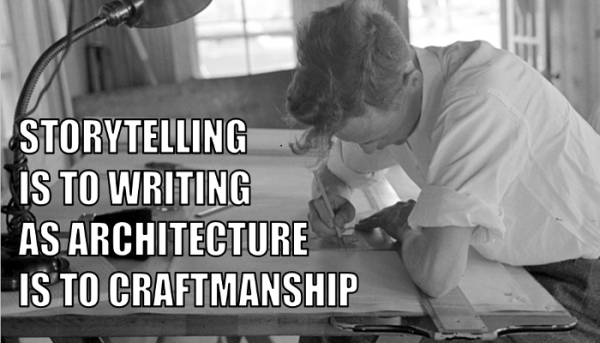
“This is heresy, high heresy,” Jeff Jarvis, director of the Tow-Knight Center for Entrepreneurial Journalism at the City University of New York’s Graduate School of Journalism said on This Week in Google. “If…I get shot at a journalism school, this is why. Journalists are not storytellers. We think that’s our highest art–our great value is we tell stories. No! We impart information and we help people get to their own information…”
Journalists are not storytellers. They are narrative-writing experts whose code of ethics precludes them from using storytelling techniques such as opinion and emotion. Storytellers enjoy many more freedoms than journalists, such as the ability to guide an audience’s perspective with emotions. The sooner that companies understand the difference between narrative writing and storytelling, the easier it’ll be to incorporate a storytelling practice into their communications.
Storytellers Are Communications Architects
Frank Lloyd Wright was one of the most influential architects of the 20th century. He ruled over his creations with an iron fist, dictating everything from a structure’s orientation to where it would be located: like over a waterfall. Rather than presenting future occupants with empty floor plans to furnish willy-nilly, Wright told them where to put his custom-designed furniture. His unwavering focus on every detail helped him control how visitors felt when they walked into one of his rooms.
Like Wright, storytellers are architects who account for every communication detail. They too rule their creations with iron fists, determining what the listeners hear, when they hear it, and what they feel.
The skills for storytelling and writing are different. Great writers aren’t always great storytellers and great storytellers aren’t always great writers. My grandfather was the best storyteller that I’ve ever met, but he couldn’t write. He only had a sixth-grade education. Frank Lloyd Wright didn’t need to be a great craftsman to be a great architect. He just needed access to talented carpenters, masons, and artisans who could transform his visions into reality.
Lastly, while the skills for writing and storytelling differ, they don’t need to be mutually exclusive. Once in a blue moon, companies will find individuals who can weave facts within the context of the human condition to create powerful prose directly, rather than handing the story blueprints off to someone else.
Are you a writer, storyteller, or a writer-storyteller?
Photo Credit: Library of Congress